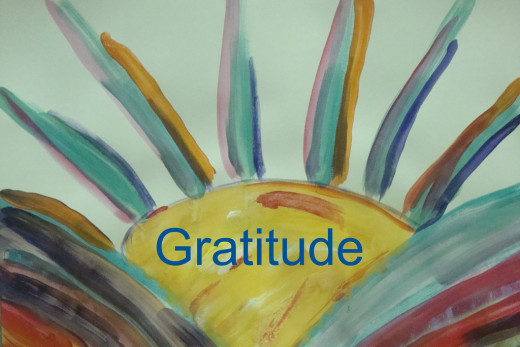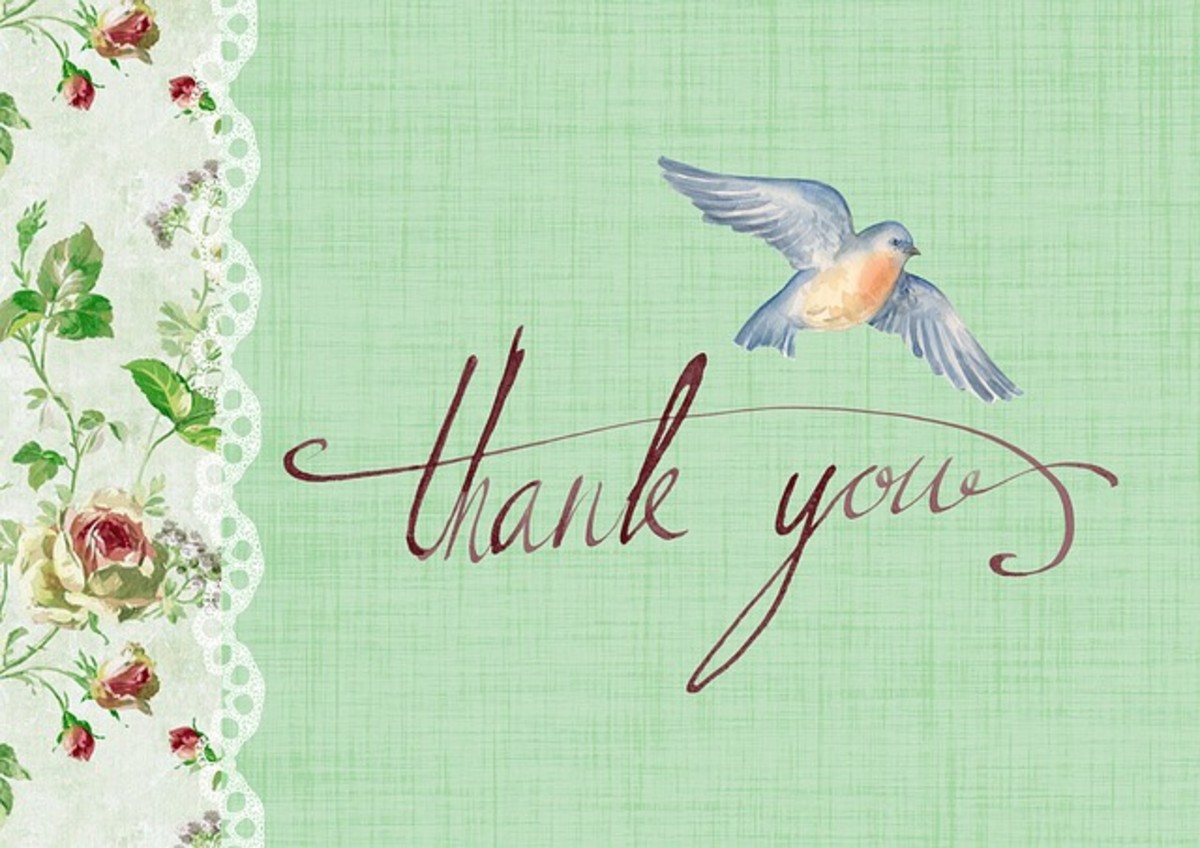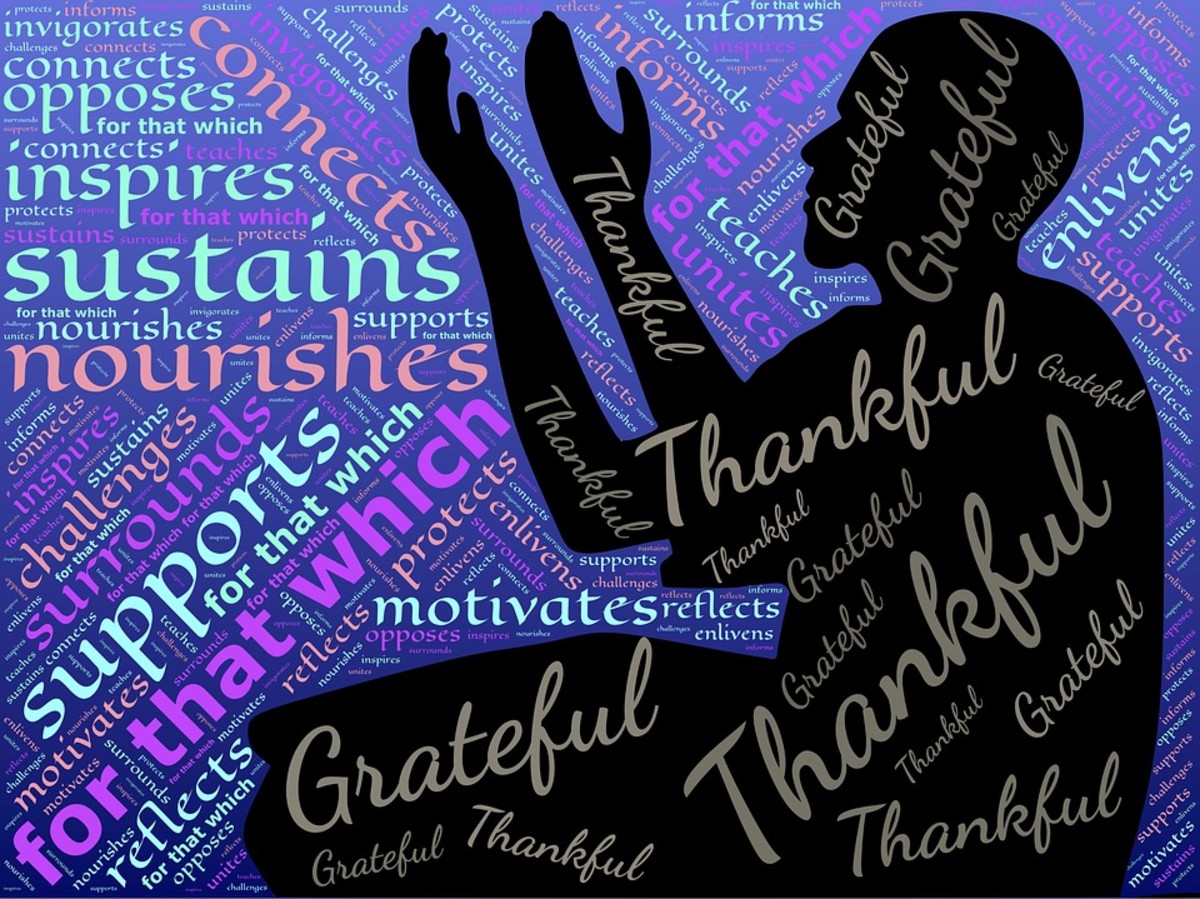- HubPages»
- Health»
- Mental Health»
- Emotions
How Gratitude and Positive Emotions Help You Create Success

The Positive Power Of Gratitude Creates Positive Emotions and Lasting Success
"Gratitude unlocks the fullness of life. It turns what we have into enough, and more. It turns denial into acceptance, chaos to order, confusion to clarity. It can turn a meal into a feast, a house into a home, a stranger into a friend. Gratitude makes sense of our past, brings peace for today, and creates a vision for tomorrow." — Melody Beattie
A few years ago, I read about the “power of gratitude” in a magazine. The author suggested that, each evening before going to bed, we write down a half dozen things for which we were grateful. Cultivating an "attitude of gratitude," she said, would make us feel and sleep better.
Being a more than an occasional insomniac, I thought I’d give a try. I bought a notebook, titled it Gratitude Journal” and began cultivating gratefulness and thankfulness by recording the things that I appreciated about each day. I also began collecting gratitude quotes and poems, and recording them in my journal.
It worked! I felt better about my day. I felt relaxed, content, and fell asleep easier and slept longer. I was amazed that such a simple technique could produce such powerful results.
Love What You Have; Create What Matters Most!
About the same time as I was starting my gratitude journal, I re-read a book called How To Want What You Have: Discovering the Magic and Grandeur of Ordinary Existence, by Timothy Miller. In it, Miller, a Buddhist, and a Cognitive Behavioral Therapist, outlines ways to be happy with what you have—even as you strive to create what you most deeply want.
One of Miller’s primary suggestions is to cultivate his Buddhist "attitude of gratitude" is to practice Compassion, Attention, and Gratitude (CAG) throughout each day.
Compassion, means seeing others as you see yourself.
Attention means noticing, being mindful of each moment, and experiencing it fully.
Gratitude means giving thanks for the many blessings you have.
After my first reading of Miller’s book, I'd tried his approach enough to realize that practicing CAG created positive mental and spiritual effects. But, I didn’t practice it long enough or consistently enough for the skills to become habitual. I'd slowly slid back into my old ways and habits.
Back then, before I'd truly "grokked" the benefits of gratitude and appreciation, I had a tendency to grind my way through each day, getting stuff done, but complaining and griping about just about everything as I did.
I was too critical to be compassionate. I complained too much about what was wrong to pay attention to and notice what was right in the world. I “should” on myself, others, and the world for not being as I thought they ought to be. And, when you’re "full of should,” it’s very hard to give thanks. It's difficult to be compassionate, attentive, or grateful. Spiritual gratitude totally eludes you.
When I read Miller's book a second time, and started keeping a daily Gratitude Journal, my ability to practice Compassion, Attention, and Gratitude increased significantly. I was developing an gratitude attitude, and experiencing the positive power of giving thanks for what I had.
Gratitude As A Strength
My understanding and practice of gratitude increased even more when I took Martin Seligman’s Values-In-Action (VIA) Signature Strengths Survey. My VIA assessment showed that “gratitude and appreciation” was one of my five key strengths.
The theory behind the VIA approach states that the more we apply our Signature Strengths on a daily basis, the more authentically happy, optimistic, and successful and we are likely to become. The printout I received suggested that I practice noticing things that I appreciated throughout the day, and let myself feel grateful for them. This further reinforced the CAG practice I’d learned from Timothy Miller.
I redoubled my efforts to practice appreciation and gratitude. I made it a regular part of my day. I routinely practiced appreciating and being grateful for my health, for work I love to do, for the freedom to live in such a beautiful place, and for helpful neighbors. I’m grateful for friends who care about me. I’m grateful for the people who appreciate my writing, coaching, and teaching.
Embracing the 10,000 Delights
As part of my daily routine, especially on the numerous walks I take to break up my workdays, I also like to pay attention to what eastern philosophers call “ the 10,000 delights” of nature.
I appreciate the songs of birds. I appreciate blue sky and misty fog. I’m grateful for rain and for the sun that shines through the clouds at the end of rain. All around me, I find things to appreciate and to be grateful for.
I am lucky. I have a good base on which to practice awareness and appreciation of nature. For five years, I was senior trainer with the Institute for Earth Education. I taught workshops in Acclimatization, a sensory and conceptual approach to ecological understanding and practice. Many of the practices I shared with children and adults were sensory awareness exercises that helped them become keenly attuned to and in love with the natural world.
The simple act of holding, rubbing, smelling, slowly peeling, and consciously eating a fresh orange on a crisp summer morning while you wiggle your toes in the cool sand of a mountain lake could become an act of love. Doing such exercises in nature reminded me of William Blake’s famous lines, “To see a World in a Grain of Sand/And Heaven in a Wild Flower.” That’s appreciation!
Daily, I’m still delighted by and grateful for the smiles and laughter of children. When I recall the saying, “a child is God’s way of saying that the world should go on,” I’m filled with warmth, joy, hope, and a deep connection to a positive future.
I still use many of the practices I developed and taught during those years. Of course, such practices take time. To do them I had to learn to stop and take time to practice.
Stopping
Another daily practice I cultivated is “stopping.”
On my way to the village each day at noon, I stop at a little bridge over a brook and let myself relax. I do a brief breathing and relaxation exercise to open and soften my heart, and put myself in an appreciative state.
Then I lean on the railing of the bridge and watch and listen appreciatively as the flowing water trills harmony with thrushes perched in the willows that draw sustenance from the stream. I let myself feel grateful for the intricate beauty and peacefulness of that little corner of the world—and for my place in it.
This small practice almost always has a huge impact on my day. No matter how crabby or negative I let myself get (usually because my writing is not going as I think it “should”), stopping on the bridge for a minute or two to appreciate and be grateful for what matters to me almost always shifts me from negative into positive emotions. The whole day, including my writing, goes better from then on out.
Practicing these simple acts of appreciation and gratitude has not only made it easier for me to love what I have. The positive energy generated by doing so makes it easier for me to create the results I truly want in all areas of my life.
Gratitude and Success
One benefit of gratitude is that it can make you more successful at whatever matters to you. When you are grateful and appreciative, you tend to get more of what you want in life and work. Why?
Because, largely, you get what you focus on. And when you pay attention to and give thanks for what you are grateful for, you focus on what you care about. Energy-robbing negativity fades away. In its place, you feel the highly energized sense of being focused on and part of what truly matters to you.
When you focus on what matters to you, and take action to support it, you're more likely to create the success you long for. You are also more likely to attract the kind and quality of support from others that you most need, when you need it.
“Gratitude is so important,” says Wes Hopper, author of The Astonishing Power of Gratitude, because it is powerfully attractive. Quoting Wallace Wattles, he says, “It connects us with the Source.” [Click the link to get the free ebook].
“You cannot exercise much power without gratitude because it is gratitude that keeps you connected with power. The creative power within us makes us into the image of that to which we give our attention. The grateful mind is constantly fixed upon the best, therefore it will receive the best.”
As we stretch, develop, and learn to live well on a healthy planet, we create ripples of positive emotions. And not just the pleasant, fleeting, surface emotions, but deeper, meaningful, life and world changing emotions such as love, compassion, contentment, and connection to meaning and Spirit.
Positive Emotions and Success In Life, Work, and … Whatever!
"Pleasant emotions like hope, inspiration, joy, and well-earned pride literally open us," says leading Positive Psychologist Barbara Fredrickson, in a recent huffingtonpost.com article. "As the blinders of negativity fall away, we take in more of what surrounds us. We see both the forest and the trees."
Imbued with pleasant emotions, we appreciate the connections we have with others more than the divisions between us. This appreciation makes it easier to cooperate and work with others. It makes it easier to co-create successful results.
"But that's not the half of it," continues Fredrickson. "Positivity's mental openness fertilizes just the sort of creative and integrative thinking that hard-to-find solutions and compromises are made of. With the throng of problems facing (us), we sorely need this expansive thinking. In addition, when we think broadly we discover and build new skills, new alliances, and new resilience - which make us better prepared to handle future adversity."
During these difficult times being prepared to handle adversity is one of the most useful skill sets we can develop. Being able to shift gears, see the opportunities in crisis, and learn new skills and practices can make bad times good.
Even small amounts of positive emotions, if we experience them regularly, can help us develop our skills and strategies for coping with adversity, making us better off next season than we are today.
Fredrickson says her research shows that, "when we experience genuine, heartfelt positive emotions in a 3-to-1 ratio with negative emotions, we cross a psychological tipping point on the other side of which we function at our very best."
Functioning at our very best! From such a deep, solid foundation of skills and positivity, creating what matters most becomes easier. And although it becomes more challenging, life also gets more engaging, exciting, and fulfilling.
So, I keep adding to my Gratitude Journal each evening. I practice Miller's CAG exercises daily. I embrace the ten thousand delights, and I stop, and look for opportunities to be grateful, to appreciate what I have, even as I strive to create what I truly want.
I can't be sure that I'll succeed at all that I set my hand to, but I do know that since I've been practicing gratitude, appreciation, and generating positive emotions, life flows more easily and effectively. And success at what matters comes easier, and more often.
----------------------
Bruce Elkin is the author of Simplicity and Success, THRIVE!, and The ABCs of Emotional Mastery. For more of his writing, please visit his HubPages profile.

Gratitude & Enlightenment!
"Every day, think as you wake up, today I am fortunate to be alive, I have a precious human life, I am not going to waste it. I am going to use all my energies to develop myself, to expand my heart out to others; to achieve enlightenment for the benefit of all beings." -- The Dalai Lama







